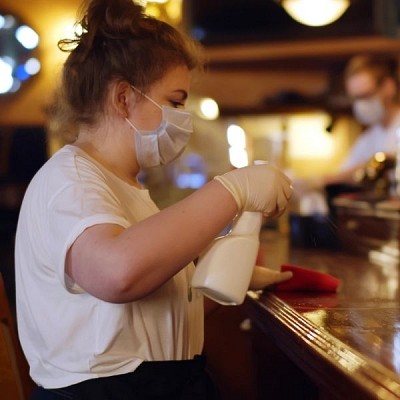When you operate or manage a restaurant, there are a lot of moving parts. There are also a lot of things to keep in mind as far as safety, health, and regulatory compliance.
One issue restaurant managers face is how to handle a sick worker. This has become even more problematic because of COVID-19.
You have a responsibility when you run a restaurant to keep your customers safe and healthy, meaning that you take every possible step to protect them from an illness, whether foodborne or otherwise. It’s estimated that 1 in 6 Americans get a foodborne illness every year. This leads to 128,000 hospitalizations because of serious illness and 3000 deaths.
At the same time, it’s difficult as a business to deal with employees who are out if you don’t have replacements.
The following are some of the main things to know about restaurant workers who get ill and how the situation should be handled.
Preparing Food When Ill
When you’re sick, or when you have an employee who is sick, pathogens can be introduced to the food.
For example, if someone goes to the bathroom because they have a stomach-related illness, then there may be fecal matter on their hands that then transfer to the food.
If someone has had any signs of illness like vomiting or diarrhea, they should not work for at least several days after their symptoms have fully ended. It’s common that foodborne illness outbreaks start because of sick employees in restaurants and food outlets.
Of course, hand hygiene is of the utmost importance too, but even nearly impeccable hand hygiene might not be enough when an employee is sick.
Developing a Sick Employee Policy
It’s reckless to have an employee work when they’re knowingly sick. Employees are often scared to tell their employer they’re sick for different reasons. For example, they might be worried that they won’t earn money when they take time off or that their employer could retaliate for their absence by firing them or cutting their hours.
As an employer, it’s up to you to create a good sick policy so that employees know what options are available to them. This will reduce their apprehension about calling out.
You can include in your policy the signs of illness to look for, what the process should be to call in, and what expectations are on your end and on the end of your employees.
Also, when developing sick policies, try to avoid requiring things like doctor’s notes. Many restaurant workers may not have health insurance, and so they may not visit the doctor for a minor illness. It could end up being very expensive for them.
However, if you start to see a pattern of absences and you think it’s becoming an issue, then you might want to have your employee bring a doctor’s note, but this should only be if you truly see red flags.
When you’re developing sick policies, put yourself in the shoes of your employees as much as you can. Be very specific in every element of the policy, including the symptoms that you expect employees to call out of work if they experience.
Providing Paid Time Off
If at all possible, it can benefit a food business to have paid time off available to employees. It can actually cost less over the long-term to offer this benefit. You’re going to reduce the risk of having an employee come to work sick and getting customers sick, which can be a legal and public relations nightmare.
It’s also a good way to attract high-quality applicants when you’re hiring for new positions.
Paid time off is controversial, but again, if it’s something that’s feasible for your restaurant, it can be valuable not just for your employees but for your business.
Know When to Report An Outbreak
As a manager or owner of a retail food establishment, you will need to know when to report a serious outbreak to your local health department. Don’t try to avoid doing this—it can mean your restaurant gets shut down.
The so-called big five as far as illnesses that are a threat to restaurants are E. coli, shigella, salmonella, norovirus, and hepatitis A.
Dealing with sick employees in a restaurant is something no manager or owner wants to face, but it’s inevitable. Protect yourself, your employees, and your customers by being proactive in the development of your policies and procedures.






































